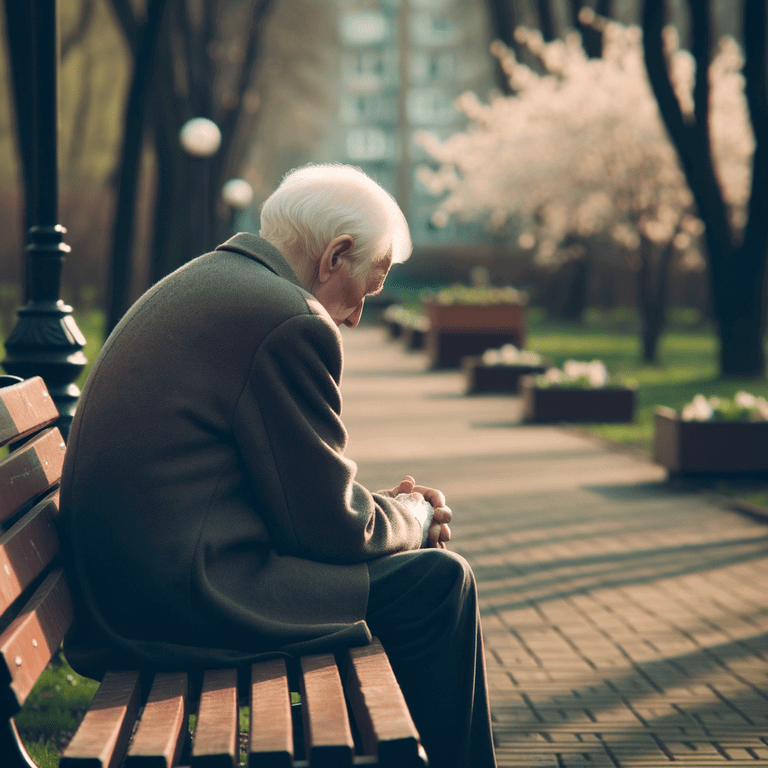Feeling Down in Your Golden Years? Symptoms of Depression in the Elderly
As we grow older, feeling blue from time to time is expected.
But when sad feelings last for weeks or more, it could be depression. Depression is an actual mental illness. It changes how you think, act, and feel. Knowing the signs can help you or your loved one get treatment early.

What Are the Symptoms of Depression in the Elderly?
There are many possible signs of significant depression. They can be emotional or physical. Here are some common ones in older adults:
Emotional Signs
- Feelings of sadness that don’t go away
- Losing interest in fun activities
- Feelings of worthlessness or guilt
- Feeling hopeless
Physical Signs
- Weight loss from poor appetite
- More physical complaints, like headaches or stomach aches
- Loss of energy and feeling very tired
People with depression may have trouble concentrating. Their movements and speech may slow down. Many people have sleep problems like not sleeping enough or sleeping too much.
Some older adults with depression even talk about death or suicide. Feeling so hopeless is a medical emergency. Call for help right away if this happens.

What Causes Depression in Older Adults?
There is no one cause of depression. Often, many factors play a role, like:
- Family histories of mental illness
- Stressful life events, such as losing a loved one
- Diseases that cause chronic pain
- Some medications
- Social isolation and loneliness
Drugs and alcohol can also trigger depression. And problems like heart disease, diabetes, or cancer often make existing depression worse.
Getting Treatment for Depression
Depression should not be a regular part of aging. But it often goes untreated in older people. Certain beliefs might stop people from getting help, like thinking depression is “just part of getting old.”
Depression can affect your quality of life at any age. The good news is treatment works well for most people. Medication and counseling (talk therapy) are common treatments.
Don’t brush off feelings of sadness or despair. Talk to your doctor if you think you might be depressed. Reach out to loved ones for support. With the right help, you can start feeling like yourself again.

Watching for Signs of Depression
As we age, monitoring physical and mental health regularly is essential. Depression often goes unchecked in older people, but keeping an eye out for potential symptoms is critical. Discuss how they feel emotionally and physically with aging loved ones.
Common Emotional Symptoms:
- Persistent sadness or feelings of hopelessness
- Losing interest in hobbies and activities
- Expressions of worthlessness or guilt
- Social withdrawal and isolation
Common Physical Symptoms:
- Fatigue, low energy levels
- Changes in appetite and weight
- Unexplained body aches and pains
- Slowed movement and speech
- Sleep disturbances
Seeking a Professional Diagnosis
If concerning symptoms arise, speak with their doctor about having an evaluation. Make it clear you are worried they may be depressed. Undiagnosed depression should not be written off as just “getting old.” With treatment, their quality of life can improve.
Exploring Treatment Options
For elderly depression, tailored treatment plans may be needed. Medication can be effective but should be carefully monitored. Counseling approaches may need adjustment for things like hearing or memory loss. Lifestyle changes should also be part of the plan.

Promoting an Active Lifestyle
Staying physically, socially, and mentally engaged helps enormously in managing elderly depression. Help aging loved ones maintain a schedule filled with activity and purpose. This can make a significant difference in conjunction with medical treatment.
The key is not dismissing the signs of depression in older people. With vigilance, understanding, and proper professional care, seniors can overcome depression and continue to thrive in their later years. Monitoring both mental and physical health is essential.
Getting Support from Family and Friends
- Having a solid support system is crucial for seniors dealing with depression. Frequent visits, phone/video calls, and sending cards or care packages show you care.
- Attend medical appointments with them to share details. You may pick up on symptoms or concerns they did not mention.
- Offer to assist with tasks that may be difficult for them, like driving, shopping, cooking, or home repairs. Reducing stressors helps.
- Invite them on outings, day trips, or family gatherings. Getting out and socializing can boost their mood.
- Reminisce together about happy memories. Looking at old photos or mementos can stir positive emotions.

Adapting the Living Environment
- Ensure their home is senior-friendly with good lighting, clear walkways, access to aids like canes or walkers, and technology like medical alert systems.
- Reduce clutter and simplify living spaces. Too much disarray can be stressful and depressing.
- Make sure they are eating regular, nutritious meals. Offer to cook or bring food. Poor nutrition can worsen mood.
- Open blinds and curtains during the day to allow in natural sunlight, which can help regulate circadian rhythms.
- Play upbeat music around the home. Soothing sounds and melodies can have a calming effect.
Wrapping Things Up
Dealing with depression is difficult at any age, but even more so for seniors, who may feel isolated and unwilling to talk about their feelings.
However, it is essential not to ignore the signs and allow elderly loved ones to suffer alone. With understanding, compassion, regular check-ins, and a proactive approach to getting professional treatment, the dark cloud of depression can be lifted.
Helping aging adults stay active and engaged, simplifying their environment, and providing solid social support enables them to manage this illness.
Though challenging, with proper care and vigilance, depression in one’s later years does not have to reduce the quality of life. There is hope for living life to the fullest at any age.

Frequently Asked Questions
What are some early warning signs of depression in older people I should look out for?
It’s essential to monitor any changes in typical mood and behaviors. Irritability, agitation, anger, anxiety, or apathy could be red flags. Watch for shifts in long-standing routines as well. Significant weight gain or loss, changes in sleeping patterns, and declining personal hygiene may indicate depression.
What role can diet play in preventing or managing geriatric depression?
Eating a balanced diet rich in nutrients can help reduce inflammation and support brain health. Including foods with omega-3 fatty acids, antioxidants, B vitamins, and fiber is recommended. Staying hydrated and limiting alcohol and sugary foods is also advised. Meal prep assistance may be needed.
How can I determine if sadness is just grief or actual depression?
Grief after a significant loss like a spouse is normal. But if feelings of hopelessness, worthlessness, or being a burden on others persist beyond a few months, it could signify clinical depression. Consulting a mental health professional can provide clarity.
What home modifications can help older people with depression?
Some helpful changes include improving lighting, reducing clutter, installing grab bars and railings, using colorful accents, keeping needed items within reach, and ensuring walkways are clear. Smart home technology like video doorbells and voice assistants can also assist.
Are there any alternative treatments that can help elderly depression?
Yes, options like pet therapy, massage, light therapy, music therapy, aroma therapy, and tai chi may complement traditional treatment. But consult their physician before beginning. Even going outdoors for some fresh air and sunshine can naturally boost your mood.
Glossary
Clinical depression: A medical severe illness characterized by persistent and intense feelings of sadness, hopelessness, worthlessness, and other debilitating symptoms. It’s more than just normal sadness or grief.
Geriatric depression: Clinical depression experienced by elderly adults aged 65 years and older.
Geriatric psychiatrist: A medical doctor who specializes in diagnosing and treating mental health conditions like depression in aging and elderly patients.
Counseling: A type of psychotherapy in which patients receive guidance and support from a licensed therapist through techniques like cognitive behavioral therapy, talk therapy, etc.
Circadian rhythm: The natural sleep cycle and wake times in the body. Light exposure regulates these biological rhythms.
Inflammation: The body’s immune response to injury or infection. Chronic inflammation may contribute to geriatric depression.
Omega-3 fatty acids: A healthy unsaturated fat found in foods like fish, walnuts, and flaxseeds that acts as an anti-inflammatory. It may help lower depression risk.
Pet therapy: The use of pets, like dogs or cats, to help improve patients’ physical and mental health. It may lift mood and reduce loneliness.
Reminiscence therapy: Recalling past experiences and events from one’s life. This can stir positive emotions, which may ease depressive symptoms.

What’s Your Next Move?
Thank you for taking the time to read this resource on identifying and managing depression in older people. We hope you found the information both enlightening and helpful.
Suppose you have an elderly loved one who is exhibiting potential symptoms of depression. In that case, we encourage you to be proactive and compassionate in getting them the treatment and support they need.
At Grand Strand Comfort Care, we assist elderly individuals in the Myrtle Beach, SC area with managing daily life through our caring home care services. If you have any other questions related to senior depression or caregiving, please feel free to get in touch with us directly to schedule a free in-home consultation.
Call us at 843-626-2613 – we are always happy to speak with local families about maintaining quality of life for their aging parents and relatives.
With understanding and vigilance, the problematic effects of depression can be minimized, even in one’s later years.


